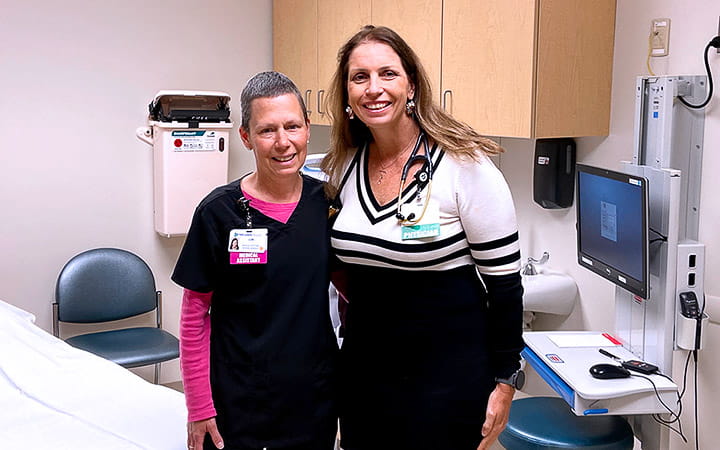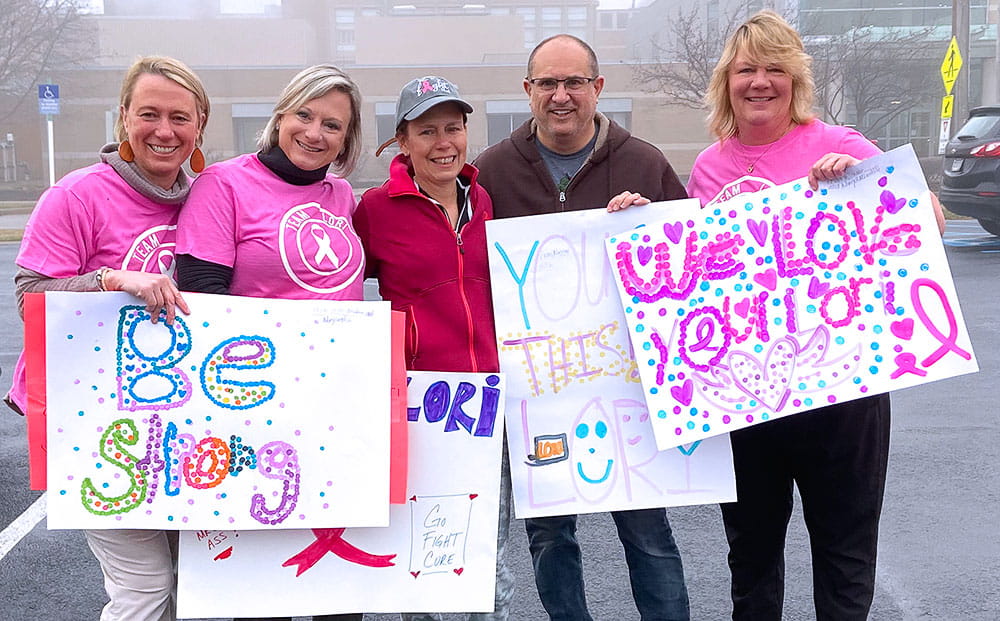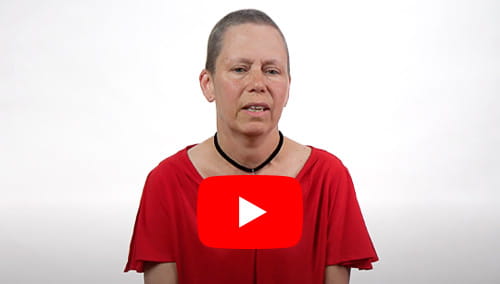A Crucial Catch Through Genetic Counseling
October 02, 2023

Lori Baum, 55, did her best to lead a healthy lifestyle, but you can’t change your family genes.
So the medical assistant who works every day with cancer patients at the UH Seidman Cancer Center at Firelands Regional Medical Center in Sandusky – one of the westernmost hospitals in the UH Seidman network – talked to the genetics team. Aditi Shah Parikh, MD and Katie Lincoln, LGC, travel from UH Cleveland Medical Center each month to consult with patients in Sandusky and lend their expertise.
Cancer has claimed far too many of Lori’s family members. Both grandmothers succumbed to cancer, one from stomach, another kidney. Lung and prostate cancer took three of her uncles. Two aunts survived breast cancer, but one died from the disease. Her parents also died from cancer – her father from lung cancer and her mother from ovarian.
“One day I explained my family history, and they advised me to get evaluated,” says Lori, who started receiving annual mammograms in her 30s due to a strong family history of cancer.
The family history of ovarian cancer in her mother and breast cancer in three maternal aunts was a particularly compelling reason for the team to recommend genetic testing for Lori. Her genetic testing did not reveal an identifiable genetic predisposition to cancer, but that is only one part of the full picture, Katie said.
“While this was somewhat reassuring, it didn’t explain the family history of cancer,” Katie said. “We counseled Lori that her chance of developing breast and ovarian cancer were higher than average based on her family history alone. Genetic testing can be a helpful tool for understanding cancer risk. But it’s not the whole story. It’s important to pay attention to family history, too.”
A closer look at the High-Risk Breast Clinic
The genetics team referred Lori to the High-Risk Breast Clinic at UH, who advised her to undergo a breast MRI as an extra level of screening for breast cancer. The MRI showed a mass in each breast, one of which was positive for triple negative breast cancer. Lori remembers the moment she saw “invasive carcinoma” in her chart and knew only too well what it meant.
Breast MRIs are the most sensitive imaging modality to assess the breast tissue. They are especially useful for patients who have dense breasts, which can decrease the sensitivity of mammography, explained Ashley Simpson, DO, FACOS, FACS, who performed Lori’s lumpectomy at UH St. John Medical Center in Westlake.
Dr. Simpson noted that Lori’s regular mammogram had been negative for cancer just six months earlier. Breast MRI can detect cancer that standard imaging may not.
“Had Lori not been evaluated in our High-Risk Clinic, her cancer would not have been detected for at least six months, which could significantly impact her stage at diagnosis and long-term prognosis,” Dr. Simpson said, adding that women should have a formal risk assessment by their physician to determine at what age, based on their family history, they should begin cancer screenings and possibly seek additional testing.
Surrounded by family at home and at work

Initially Lori was scared and overwhelmed. But she drew strength from seeing cancer patients fight daily and rallied her family – both at home and at work.
It was the first surgery Lori had ever had, and everything about the experience impressed her. Her awe extended to her chemotherapy at Firelands, where all her sisters – two of whom had undergone lumpectomies before – traveled from different corners of Ohio to surprise her with Team Lori spirit. At her second chemo treatment, co-workers surrounded her with support, sporting their own Team Lori shirts. Friends provided thoughtful treat bags on each of her treatment days.
The support from each of these was critical, as well as the love of her husband of 24 years, David. But she also relied on her work family, deciding to receive her chemotherapy and radiation treatments at the cancer center that knew her best.
“I knew I was in good hands,” says Lori. “It’s like being taken care of by family.”
Amy Reese, MD, a hematologist/medical oncologist, saw Lori through 16 rounds of chemo over four months. Lori also underwent 15 rounds of radiation, a daily 15-minute treatment over three weeks.
Dr. Reese was glad Lori stayed close to home for her treatment.
“Some people would have reluctance being treated where they work, wanting to separate their work and personal lives,” says Dr. Reese. “But we work hard to develop a team approach, and Lori knew we would take good care of her. Still, I was honored she put her trust in me.”
A journey lined with blessings
Along the way, Lori has found her cancer journey lined with blessings: having an experienced doctor she knows well and admires as her personal physician; having the strength to return to running and recently finish a 5k; and sharing her personal cancer experience with frightened patients who need reassurance.
She’s shown patients the port through which she received chemo. She’s open about the long hair that is now growing back, but a bit differently. She wants her patients to know she’s a survivor, and they will be, too.
“Everything that cancer took away from me I’m getting back,” says Lori, who once again runs around with 3-year-olds at her church day care on Sundays and is working full-time at Firelands.
“If I didn’t get checked out. I don’t know where I would be right now. Life is busy, it can be crazy, but you have to make time for screenings. Screenings can save your life.”



